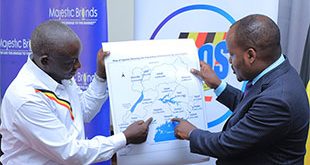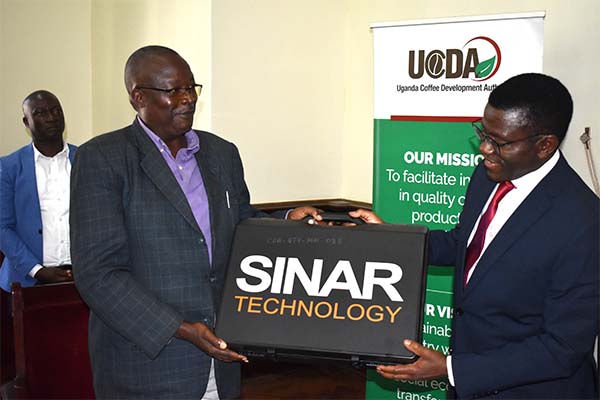
Bulange, Mengo | LOUIS JADWONG | The Prime Minister (Katikkiro) of Buganda Kingdom Charles Peter Mayiga, has said government has no business getting directly involved in managing the coffee sector, and warned of ill-advised plans to phase out the Uganda Coffee Development Authority (UCDA).
The Katikkiro told coffee stake holders, led by UCDA, aBi and the private sector who visited him Friday in Bulange, that from his seven year experience with the “Mmwanyi Terimba” project, UCDA has all the structures that government lacks to manage farmers.
Mmwanyi Terimba is a hugely successful effort led by the Katikkiro to encourage farmers in Buganda to earn a living by growing coffee. Buganda has in 2021 even set up Mwanyi Terimba , a company limited by shares to buy coffee from farmers and also find an external market.
“We have about 15 million people who are directly and indirectly involved in the coffee business. An authority which ensures the livelihood of these people, should not be disorganised, even in 2027 as is being proposed,” Katikkiro Mayiga said, adding that “therefore, all of us need to urge parliament and the president to completely abandon the idea of phasing out UCDA. It would be a big mistake.”
He had earlier got a detailed technical brief on the new European Union Deforestation Regulation (EUDR) law that requires that all countries trace each kilogramme of coffee exported to the EU back to the producer. The regulation seeks to ensure that oil palm, soy, wood, cocoa, coffee cattle, rubber, and associated products, imported, exported, and traded within the EU, are not associated with deforestation and forest degradation.
“These new regulations by the European parliament underpin the importance of UCDA. Who is going to engange with farmers and stakholders to ensure compliance? The Ministry of Agriculture MAAIF? I highly doubt they can; the mechancisms are not in place at all,” Mayiga said.
Etteeka Eppya ku Mmwanyi: Katikkiro @cpmayiga agumizza abalimi#EmmwanyiTerimbahttps://t.co/ydZWPg9cUA
— Buganda Kingdom (@BugandaOfficial) September 6, 2024
As Mayiga was speaking, NRM Caucus MPs were at State House debating the future of UCDA.
The MPs agreed to support all 16 rationalization bills, with only Uganda Coffee Development Authority (UCDA) and National Information and Technology Authority Uganda (NITA-U) accorded the special extension of 3 years as transition periods.
Hamson Obua, Government Chief Whip reasoned that “rationalization is intended to make government appear leaner, aiming at avoiding duplication. That is why there will be a department established under the Ministry of Agriculture to look at strategic crops like coffee, that department will be accredited internationally, which takes some due process.”
He argued that,” the reason why we are saying for now, we create a transitional period for coffee, is because the process of accreditation will take some time, but also give the Ministry of Agriculture an opportunity to reorganize itself.”
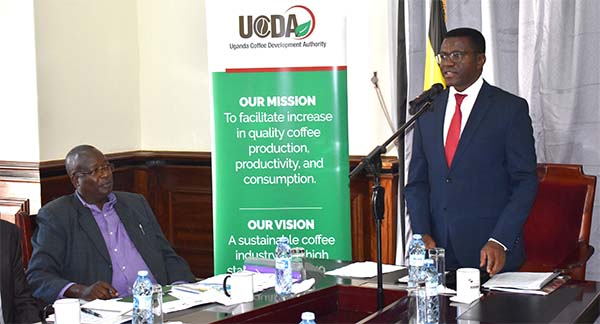
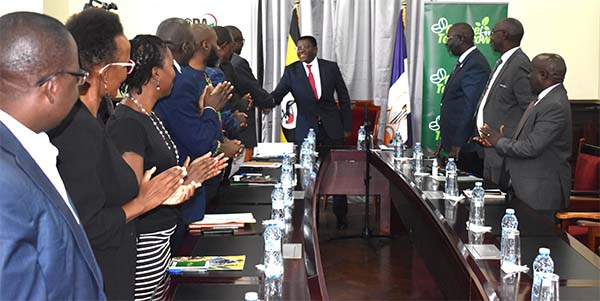
Following the recent approval of the European Union Deforestation-Free Products Regulation (EUDR) by the European Council on May 19th, the coffee industry is now faced with the imperative of adopting digital tools to ensure compliance with this new regulatory framework.
“The law (EUDR) requires that we trace each kilogramme of coffee exported to the EU back to the producer,” Dr. Gerald Kyalo, Director Development Services, UCDA in his brief.
Kyalo said coffee serves as a fundamental pillar for rural livelihoods and the overall prosperity of Buganda and Uganda as a whole.
” Over the last 10 years, Uganda has seen a steady increase in coffee exports, from 3 million bags to over 6 million bags today. Buganda has played a crucial role in this achievement, as it is a major contributor to the coffee industry,” he said.
In order to comply with EUDR, the sector is currently in the final stages of rolling out a country-wide coffee value chain registration exercise, which will form the basis for coffee traceability. This will require the registration of all coffee plots across the country.
Enumerators will visit all coffee farms, recording a minimum set of data required for EUDR compliance verification, including geo-locations of coffee plots. UCDA said that to ensure the success of the registration exercise, they need full cooperation of industry players, cultural, religious, administrative and political leaders. This, he added, will help address any suspicion or resistance among the coffee farming and trading constituency.
It is also crucial, he said, that any expansion of coffee cultivation is done in compliance with the EUDR, ensuring that new plantations are not established by cutting down natural or plantation forests.
“We request for your support and endorsement, Owek. as we undertake the activities on value chain registration to ensure traceability of our coffee such that our coffee is compliant and can continue accessing the EU market,” said the UCDA chief.
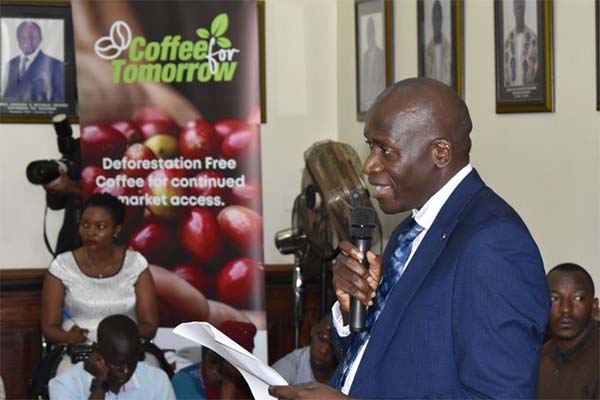
According to Moses Nyabila, CEO of aBi Development Ltd, the organisation has allocated sh16 billion to the coffee sub-sector for EUDR compliance activities.
“Our target is to have 1 million farmers registered and geo-located by the end of the year. We want to ensure that farmers continue to trade and the quality of the coffee reflects in the price they get from buyers,” Nyabila said.
Uganda’s coffee exports to the EU averages 63 percent in the past 10 years. The legislation therefore has a direct impact to Uganda’s Coffee trade to the European Countries. Under this Regulation, seven agricultural commodities imported in the European Union, including coffee and cocoa, must be sourced from land that was not deforested after December 2020.
Samson Emong, the Country Manager, Cafe Africa however argued strongly that Uganda’s coffee does not cause deforestation.
“Uganda coffee doesn’t contribute to deforestation, the only problem is that we can’t provide data within the EU parameters,” he said.
Emong is part of the task force discussing matters regarding the EU Deforestation Regulation (EUDR).
“The EUDR is a law that we agree with. We should be able to conserve the environment. The access and maintenance of the EU market is important to us,” he added.
The European Union’s new regulation on deforestation-free products (EUDR) comes into effect on 31 December 2024.
Mayiga promises to work with UCDA
Katikkio Mayiga assured UCDA of their cooperation, saying all they need is support to enable the Kingdom officials to reach even the remotest villages in Buganda to sensitise them about the registration.
“We are going to join hands with the government to ensure that coffee is not grown on deforested land. It is our duty to sensitize coffee farmers about registration,” said Katikkiro Mayiga.
“It is important for us to collaborate with the government and UCDA so that people understand that this registration is for their own good,” he said. “And I think we will need significant support to meet the registration deadline before the year ends.”
He also reassured farmers, many of who are in his Mmwany Terimba project, that the registration, that will involve picking GPS coordinates using satelites, is not for purproses of EFRIS and other taxes.
The country has earned US$1.14bn in the financial year 2023/24, exporting a total of 6.13m bags, according to the Uganda Coffee Development Authority. This represents a 6.33% increase in value from the previous financial year, when Uganda exported 5.8m bags, bringing in $846m.
Most coffee prodcution is in Buganda.
RELATED VIDEOS and STORY
 The Independent Uganda: You get the Truth we Pay the Price
The Independent Uganda: You get the Truth we Pay the Price

